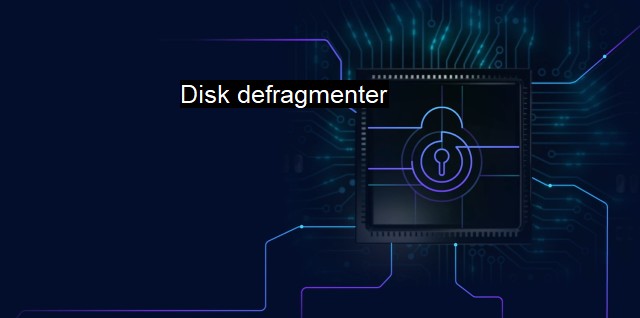What is Disk defragmenter?
Enhancing System Performance and Cybersecurity through Disk Defragmentation: A Comprehensive Guide
Disk Defragmenter is a critical tool in cybersecurity systems implemented in various operating systems like Windows, macOS, and Linux to enhance performance and speed data access times. A Disk Defragmenter is essentially a utility software that is designed to mitigate the problem of fragmentation in your computer's hard drive. So let's explore the process of fragmentation, why it happens, how Disk Defragmenter solves this problem, and its relation to cybersecurity and antivirus.Fragmentation is a natural consequence of how computer systems save data on hard drives. When a computer saves a file, it may not always store the file's parts continuously in one location; they are stored in several areas on the disk drive. This fragmentation of data is typical, but as more and more files are written, changed, or deleted, these multiple fragments can slow down your computer. This decrease in performance happens because the read/write head of the hard disk must travel to different locations on the disk to retrieve all these fragments and compile them into a complete file.
Here’s where Disk Defragmenter steps in. This utility organizes fragments of files on your hard disk into continuous sequences. It reorders fragmented data, making your hard drive run more efficiently. With less time and distance to travel, the read/write head can access complete files faster, boosting the overall performance of your computer. Disk Defragmentation also frees up space on the drive, allowing the system to reduce the number of fragments created in future data writing operations.
Disk Defragmenters carry significant yet indirect significance. While they do not inherently protect the system from cyber threats like malware or viruses, the process of defragmentation might indirectly play a pivotal role in antivirus functions.
Antivirus software scans your computer regularly, going through each file to ensure no malicious data is present. When files are fragmented, this process can take significantly longer as the antivirus software needs to scramble around the hard disk, collecting pieces of dozens, hundreds, or thousands of files, before it can conclusively find the presence of harmful data. Because defragmentation aligns the data in consecutive order, antivirus software can scour your files much more quickly. This speed becomes crucial, especially under a threat situation when every second counts.
a Disk Defragmenter might aid existing antivirus software in fully deleting malicious files. It is known that even after an antivirus eliminating a virus, some fragmented and hidden parts might remain on the system. The defragmentation process can expose these hidden fragments, allowing the antivirus software an additional chance to find and eliminate them.
Like all aspects of computing, Disk Defragmenters also have a few limitations. They work most effectively on magnetic or spinning disks, like hard disk drives (HDDs), rather than solid-state drives (SSDs). That's because the mechanical aspect of how data is stored or retrieved on an HDD is removed on an SSD. Also, repeated defragmentation can cause wear and tear on HDDs, and it is always advised to backup data as an unexpected power outage could potentially damage the integrity of files during the defragmentation process.
Although a Disk Defragmenter isn't a cybersecurity tool in itself, its role in enhancing the efficiency and efficacy of antivirus software is undeniable. It also contributes to the overall health and longevity of computers' hard disk. Today, modern operating systems like Windows 10 automatically defragment your disks occasionally in the background manual defragmentation can be required as per specific needs. Thus regardless of its limitations, Disk Defragmenter remains a valuable addition to your overall cybersecurity and system maintenance toolkit.

Disk defragmenter FAQs
What is disk defragmenter and how does it relate to cybersecurity and antivirus?
Disk defragmenter is a utility that arranges fragmented data on a hard drive, resulting in improved performance. While it's not directly related to cybersecurity and antivirus programs, using a disk defragmenter can help with malware removal by optimizing system performance and allowing antivirus software to scan more efficiently.Is it safe to use disk defragmenter on my computer?
Yes, it is generally safe to use disk defragmenter on your computer. However, it is always recommended to back up your important files and data before running any utility that modifies the system. Disk defragmenter is a built-in tool in Windows, and there are also third-party programs available, but it is important to download and use reputable software.How often should I run disk defragmenter on my computer?
It is recommended to run disk defragmenter on your computer once every few months. However, the frequency of defragmenting depends on how often you use your computer, how many programs and files you download, and the size of your hard drive. Some third-party programs include automatic scheduling to defragment your computer on a regular basis.Does disk defragmentation have any effect on my computer's security?
Disk defragmentation does not affect your computer's security directly. However, optimizing your computer's performance can indirectly contribute to better security by allowing antivirus software to run more effectively and helping to identify and remove malware. It can also prevent crashes and other technical issues that could lead to security vulnerabilities.| | A | | | B | | | C | | | D | | | E | | | F | | | G | | | H | | | I | | | J | | | K | | | L | | | M | |
| | N | | | O | | | P | | | Q | | | R | | | S | | | T | | | U | | | V | | | W | | | X | | | Y | | | Z | |
| | 1 | | | 2 | | | 3 | | | 4 | | | 7 | | | 8 | | |||||||